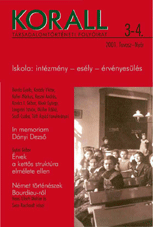A kulturális környezettől a társadalmi feltételekig
From cultural setting to social conditions. The social roles of education
Author(s): András KeszeiSubject(s): Cultural history, History of Education
Published by: KORALL Társadalomtörténeti Egyesület
Keywords: social history; education; 18th–19th centuries; Hungary
Summary/Abstract: The paper would like to examine some aspects of the cultural and social functions of education in different historical contexts. By emphasizing the significance of a culture in the construction of social reality I wanted to call the attention to the importance of the socio-cultural background of this construction. Culture, as a system, that is to say a kind of toolkit; which enables us to become parts of it, to play our roles according to its norms, values and rights, together with the given power-relations of a society constitute the „playground" for social actors. The socio-cultural and historical dependence of understanding our world and expressing ourselves in it through „meaning making" (giving meanings to objects and phenomena), is a crucial factor in interpreting and constructing social and historical „realities". This „meaning making" however is not, was never an arbitrary process. Culture, defining the general criteria of „right" and „wrong", facilitates and legitimates some meanings while suppressing others. Changes in the structure of a society often have cultural consequences as well: people see and interpret their world and themselves in it differently (like the bourgeoisie in 18th and 19th century Europe.) Education (in the family and at school) is of primary importance when speaking about the mediation of the above mentioned toolkit. Comparing two basic models, the estate-society and bourgeois society it becomes clear that education could not be context-free: the given norms and power relations always influenced the ways of understanding the role and significance of education.
Journal: Korall - Társadalomtörténeti folyóirat
- Issue Year: 2001
- Issue No: 3-4
- Page Range: 53-69
- Page Count: 17
- Language: Hungarian

